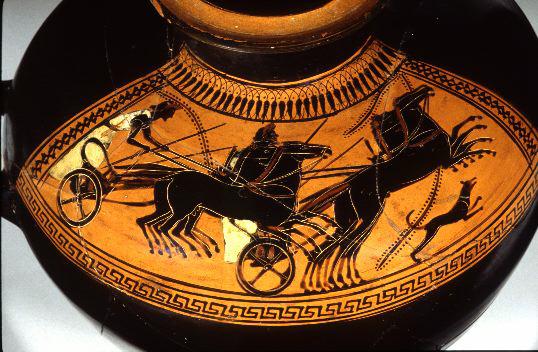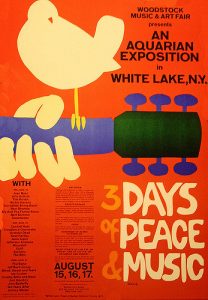The Olympic Games weren’t always as majestic as they are today. In our modern times, every four years the eager anticipation of once again witnessing the talent of nationally recognized athletes competing overshadows any other occurring events; that’s exactly how it was in ancient Greece. However, the purpose for the games has shifted over time. The first Olympic games made its mark in history in 776 B.C.E. Competition within ancient Greece was intended to demonstrate power and wealth to the Greek world. The human body was treasured for its physical capacity. As a result, competitive games often tested the endurance of the body. Festivals honoring the Greek gods were also a popular setting for hosting competitions. Although they were not yet named Olympic games, these competitions attracted crowds interested in moments of exhilaration in their otherwise ordinary lives. At that time, the games were a uniting hallmark of Greek culture and religion, a recognition of athleticism, as well as an indicator of Greek wealth and prowess that contributed to Greek self-identity.1

Religious festivals were celebrations honoring the Greeks’ gods and goddesses. The Greeks praised the gods; a way of doing so was by partaking in the funeral games, such as the one that Homer tells us about in his epic poem Iliad, where the hero Achilles holds such games in honor of his dead friend Patroclus.2 Today we attend funerals that are full of sorrow and sympathy, but the services the Greeks would host were filled with enjoyment and competition. They saw this as a way to honor and worship the gods, by acting in competitive games. Many of the athletic events eventually evolved into the Olympics. Chariot races of dashing horses, wrestling and boxing matches that were barbarous, foot races, discus throwing, archery, and spear throwing were the activities everyone put their time into at this festival.3
The Greeks believed that Zeus would favor some athletes and deny victory to others, so the athletes who were not denied saw this as empowering. The Greeks loved to be seen as worthy by the gods, so when Zeus would favor certain athletes, those competitors became evermore interested in the outcome of the games. The Nemean Games honoring Zeus was a huge festival the Greeks attended. One of the myths describing the origins of these games claims that they began as funeral games for prince Opheltes, who died as a baby in Nemea. During this festival, athletic and equestrian events were held. The Greek gods contributed to the start of the games. They were divinities that the people looked up to in a literal sense, since their home was thought to be at the top of Mount Olympus, “home of the gods and goddesses.” However, who was allowed into the games? Well, it turns out that if one weren’t Greek or if one spoke a different language, one was forbidden from entering or participating. Only free men were initially allowed to participate in games. Women were prohibited from engaging in or watching the games because the games tended to get severely brutal, and such brutality would scar the eyes of the women.4

In Homer’s portrayal of the funeral games for Patroclus, the hero Diomedes was the first to win the chariot race. He was rewarded with a slave woman and a cauldron. Prizes in the Olympics weren’t always like the ones Diomedes received, but they were ones that would make a Greek famous and rich.5 The winning athletes were presented with a wreath of olive leaves. Also, the city-state or polis for which they were representing gave the competitor a monetary award.6 But for equestrian events, the rider was never given the prize; it was given to the owner of the horse. The games in the Olympics were not quite the same ones we have today. The games in ancient Greece evolved into more challenging events. For example, the chariot races then had competitors racing while wearing armor; today, we no longer have this game. A popular competitive event today is volleyball, but it did not exist in the ancient Greek events. This is an example as to the changes that have been made over time.
Preparation for their exercises during training was a big deal to the instructors and to the athletes. The Anointer played a role in their training. He was the one who would smear oil on the athletes’ bodies in a certain circular technique; he kept the athletes’ bodies relaxed by doing this. Greeks would have to train for at least ten months before they would partake in their specific duels.7 One of the famous wrestlers, Milo, is an example as to how the athletes would train. Milo carried a calf over his shoulder every day, so the heavier the calf, the faster and stronger his body became. His training led him to win thirty-two wrestling competitions; to show that he was capable of doing this he had carried an ox on his shoulders through the Olympia stadium.8
One of the most important outcomes from the start of the Greek Olympic games was that every time they hosted them, all conflicts were put on hold between all Greek poleis or city-states. The competitions were a chance for the Greeks from different poleis to intermingle. The leaders from the different poleis went to support their athletes, but also to negotiate political disputes with the other leaders. This was called the Olympic truce, meaning that there was an agreement on making sure that there would be no warfare occurring during the games. This truce was made to maintain the focus on the games. The Greek religion was mainly about worshiping the mythological gods and goddesses, so the Olympics became a practice for the people in honoring their gods. Those who participated in the games were held at a high standard because they were representing their polis. In ancient Greece, the games gave the city-states the opportunity to come together and work out their conflicts face-to-face without warfare. In the modern era, we too strive for the same thing, for the Olympics to be a bridge between peoples and a place where political differences are set aside. But there have been many situations in the past that causes it to be troubling in this era.
- Salem Press Encyclopedia, January 2016, s.v. “Religion and Mythology in Ancient Greece,” by Judy Johnson. ↵
- Homer, Iliad (Boston: Houghton Mifflin & Company, 1881), 240-252. ↵
- Salem Press Encyclopedia, January 2015, s.v. “Olympic Games in the Ancient World,” by Thomas J. Sienkewicz. ↵
- Salem Press Encyclopedia, September 2016, s.v. “Sports and Entertainment in the Ancient World,” by Patrick Adcock. ↵
- Homer, Iliad (Boston: Houghton Mifflin & Company, 1881), 240-252. ↵
- Barbara Maussier, “The New Ethical Dimension of Sports Events: a Reflection on the Evolution from the Ancient Greek Olympic Sports Festival to Postmodern Sports Events,”Cultura, Ciencia y Deporte 12, no. 34 (January 2017): 21. ↵
- Salem Press Encyclopedia, September 2016, s.v. “Sports and Entertainment in the Ancient World,” by Patrick Adcock. ↵
- Encyclopaedia Britannica, June 2017, s.v. “Milo of Croton.” ↵



73 comments
Diego Aguilera
I always watch the olympics and very interested in the origin of them. To know that the games we held mainly in honor of Zeus is cool as he is seen as a symbol of great power and a leader. The really enjoyed the facts within this article and also the great imagery within this article as it taught me a lot the I don’t know and can do more research on.
Stephanie Silvola
Being part of the latin team in my high school, we had to deal with a lot of Greek and Roman mythology. My interest soon expanded into the Greek arts. The origin of the Olympics was well written out in the article. The Olympics were held mainly in honor of Zeus, but it was also for the other gods as well. I didn’t know that there were funeral games held as well, this an interesting fact given by the article.
Mason Meza
I have always been a big fan of the olympics. I love watching sports and I am very athletic, so reading this article and reading how they began in Greek and have developed into one of the most popular games is very interesting. The Olympics bring people from all over the world to watch people from different countries compete in several different sports. This is a time where no one fights, although it does get very competitive. Kudos to the author for writing such a well written article.
Esperanza Rojas
The games have never really been my favorite thing to watch but to hear this was once a way to unite people, well men, and it was calm and peaceful and full of life. This reminded me of the Mexican holiday,Day of the Dead , when funerals are celebrated rather than depressing. The only thing about the article writing is that it expresses that the Olympics are not how the are today, it is expressed too many times on the same way.
Valeria Perez
It is interesting to hear about the origins of the Olympics. I really found the Greek’s perspective about the human body really interesting as well as the big role that divine interference played.
As I was reading I enjoyed finding similarities between the ancient and modern games. During both times the games served to show off a country’s power through the athlete’s skill. And how along with being a display of power they also served to put a temporary truce between poleis.
Engelbert Madrid
The history of sports in Ancient Greece is one of the most important events of early civilization. Reading the article gave me a better understanding on how Greek athletes viewed the sports that they played. The sports weren’t played only for fun, but also for respect and honor to their gods. Athletes had the goal mindset of winning, so that their gods could reward them in the future. However, I would have liked to know more of how the sports were played. But overall, the article was interesting to me.
Sabrina Hsu
I always forget that the Olympics started that long ago. It’s crazy to think that it has been around since 776 BCE. A lot of people don’t even know that the Olympics were started as a way to honor the gods. I think it’s amazing that it has transformed so much over the years. I also found it really interesting that the different Greek city-states would put their conflicts on hold to come together for this event because we kind of do this today with our Olympics. Even though some countries might not have the best relationships together, they all still come together every four years to have the Olympics.
Harashang Gajjar
Triumphant athletes were given not only large monetary awards, but also free meals for the rest of their lives. The citizens and leaders of the city-state took great pride in their athletes and publicized their accomplishments far and wide.During the Olympics, leaders from the various city-states discussed important political and economic matters. In the ancient world, major leaders rarely met the same place at the same time. As the games approached, everyone generally agreed to an Olympic truce, a time when warfare usually ceased. Athletes and spectators were granted immunity to travel to and from the games
Jose Fernandez
I really enjoy watching the Olympics, so I found the article very interesting. I think it is important to know how the Olympics were related with the gods throughout history. The thing that amazed me the most is that the Olympics involved a truce between enemies. This is a clear example of how sports bring people together. The article is well written and well researched.
Lamont Traylor
This article has been by far the most interesting and it is my new favorite article. This article is well written, and it talks about things that I really like and appreciate such as sports and physical prowess. I never knew that the Olympics were like that back in those times. I almost feel as though we should use more of their traditions in today’s Olympics such as the funeral parties instead of the sad funerals we have today.